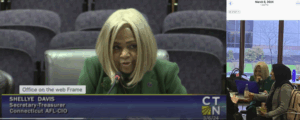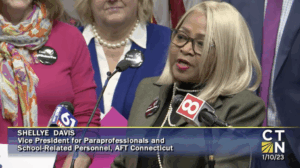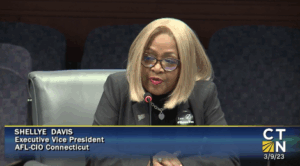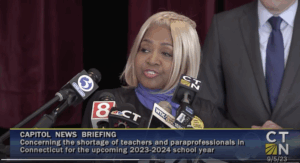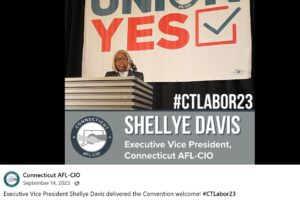In Connecticut, students who miss more than 10 percent of school days in a year are labeled “chronically absent.” That designation triggers a series of interventions: districts must notify families, monitor attendance closely, and implement support plans. Chronic absenteeism, after all, is strongly linked to lower achievement and wider opportunity gaps.
But when it comes to adults in the building — especially those who double as union leaders — the same standards seem not to apply.
Nearly a Year of Absences in Less Than Three
According to time sheets obtained through a Freedom of Information Act (FOIA) request, Hartford public school paraeducator Shellye Davis — who serves as president of the Hartford Federation of Paraeducators (HFP) and secretary-treasurer of the Connecticut AFL-CIO — was absent 152 times between August 26, 2021, and March 22, 2024.
That’s nearly the equivalent of an entire school year missed in less than three.
By school year, her absences break down as follows:
- 2021-2022: 45 days
- 2022-2023: 51 days
- 2023-24 (through March): 56 days
That’s more than triple the threshold that would classify a student as chronically absent. And unlike students, Davis doesn’t face home visits, intervention plans, or mandatory attendance meetings. Her time away is treated not as a red flag but as a taxpayer-funded perk of union office.
Absence Categories:
Her 152 absences include:
- 55 sick days
- 38 “professional development” days
- 33 union leave days
- 26 personal days
In Hartford Public Schools, time off for union-related activity isn’t just tolerated — it’s contractually sanctioned and taxpayer funded. The HFP’s collective bargaining agreement allows members to take paid leave for “special leadership training opportunities and for special Federation business” with approval that “shall not be unreasonably denied,” at the request of the union president and subject only to the superintendent’s signoff.
This provision effectively grants union leaders broad discretion to pull employees from the classroom for political events, lobbying, and internal union functions — all on the public dime.
“Professional Development” or Politics?
The collective bargaining agreement gives paraeducators the option to take time off for professional development (PD) supposedly to help them build skills and earn credits toward pay increases.
In theory, PD leave is meant to help paraeducators strengthen skills and earn credits toward pay increases. In practice, some of these days end up as political field trips disguised as professional growth. Instead of studying or attending training, Davis uses this perk to spend time at the Capitol, pushing bills unrelated to her job or cozying up to lawmakers — far from any classroom, and even farther from the kind of learning the policy was meant to support.
- March 6, 2024: Davis took a PD day but was recorded on CT-N cameras testifying at the Capitol on two bills — one on education, another on taxing the rich — and later socializing in the Legislative Office Building cafeteria with Rep. Maryam Khan (D-Windsor).
- January 10, 2023: She claimed a half–day of PD beginning at 12:05pm, but was already at the LOB by 11:00 for a press conference. Whether she was on the clock or just banking on no one checking is unclear, but either way she wasn’t with students.
- March 9, 2023: Another PD day was spent not to improve her classroom skills, but to testify in favor of a bill to eliminate the subminimum wage for restaurant workers.
These instances raise questions about whether “professional development” is serving students — or political agendas.
Union Leave as a Perk
Union leave days reveal a similar pattern.
- September 5, 2023: Davis missed a full day to attend a 49-minute press conference.
- September 14-15, 2023: She spent two full workdays at the AFL-CIO convention at Foxwoods Casino.
- October 12, 2023: She took leave to present Sen. Martin Looney (D–New Haven) with a labor award.
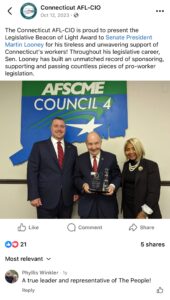
In September 2023 alone, Davis was absent 14 of 20 scheduled school days, according to the Hartford Public School calendar.
And these are just the dates with photographic or video evidence. For the other 140 + absences, her activities remain unclear — but what is certain is that she was not in the classroom.
Double Pay, Zero Accountability
Of Davis’s 152 absences, at least 33 were taken as union leave days, during which she continued to collect a taxpayer-funded paycheck despite also drawing compensation from her union. In effect, Hartford residents are paying for her to miss school while lobbying lawmakers, attending rallies, and appearing at press events.
Meanwhile, students who miss just 10 percent of the year are subject to strict monitoring and interventions. But when a public employee misses 30–40% of the year and calls it “professional development,” nobody blinks. Hartford Public Schools’ own literature calls chronic absenteeism “a leading indicator of academic risk.”
So, what happens when the adult responsible for supporting students with special needs — some of the district’s most vulnerable children — is the one chronically absent? Teachers must scramble to cover, classrooms are disrupted, and the students most in need of consistency are left without it.
Time to Hold Adults Accountable
Public school systems can’t afford to look the other way when it comes to chronic absenteeism — whether it’s a student or a staff member.
If it’s unacceptable for students to miss 50 days of school, it should be even less acceptable for the adults paid to help them succeed. Yet the union elite enjoy what seems to be an endless supply of paid time off with zero consequences — while students fall through the cracks.
Districts should:
End taxpayer-funded union leave. Union business should be conducted on union time, not public time.
Professional Development should require verifiable documentation tied to actual classroom improvement, not serve as cover for political activity.
School districts should track and report employee absenteeism the same way they do with students — and apply the same interventions to both.
Until school districts start holding staff accountable the same way they hold families and children, students will continue paying the price for adults who treat public education as a side hustle.

